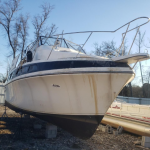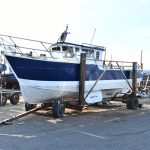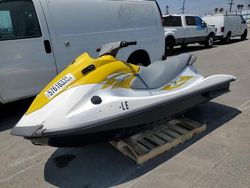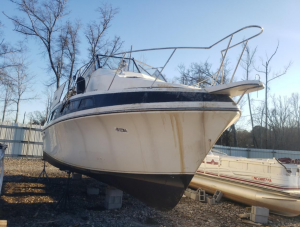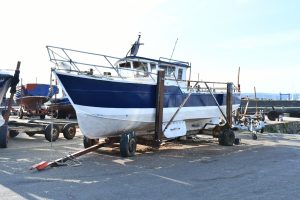When it comes to buying salvage boats online, navigating the legal waters and developing successful bidding strategies are crucial. Understanding salvage titles, evaluating boat conditions, and post-purchase considerations are key aspects to keep in mind. This article will provide a comprehensive guide to help you score big on salvaged boats at online auctions.
Navigating Salvaged Boats: A Buyer’s Guide
Understanding Salvage Titles
When we dive into the world of online boat auctions, it’s essential to grasp the concept of salvage titles. These titles are given to boats that have been declared a total loss by insurance companies, often due to events like storms or accidents. But don’t let that steer you away; with a keen eye and the right knowledge, we can navigate these waters to find a vessel that’s a true treasure.
Salvage Trucks for Sale might not be what we’re after, but the principle remains the same: a salvage title can mean a significant discount on the price. Here’s a quick checklist to keep in mind:
- Verify the title’s authenticity with the local DMV.
- Understand the extent of damage and repair history.
- Consider the potential for hidden costs.
Remember, a salvage title doesn’t always mean a sunken ship. With the right approach, we can resurrect a boat from its watery grave and set sail on a budget.
Evaluating Boat Conditions
When we’re on the hunt for a salvage boat, it’s like we’re detectives piecing together a puzzle. Each clue we uncover about the boat’s condition can lead us to a treasure or a trap. We must be meticulous in our inspection, ensuring we don’t sail into a deal that’s more of a wreck than a wonder.
Interior Inspection is crucial. We look for signs of water damage, mold, or excessive wear and tear that could signal a sinking investment. The hull is our boat’s armor; examining it for cracks, dents, or shoddy repairs is non-negotiable. And let’s not forget the heart of our vessel—the engine. We listen for any unusual noises and check for smooth operation, because the last thing we want is to be stranded at sea with a faulty engine.
Remember, the goal is to sail, not sink. A thorough inspection will help us navigate away from potential disasters and towards a worthy investment.
Here’s a quick checklist to keep in mind:
- Examine the Hull: Look for cracks, dents, or previous repairs.
- Test the Engine: Listen for unusual noises and check for smooth operation.
- Electrical System Check: Ensure all components are functioning correctly.
By understanding what to look for and enlisting the help of an expert, we can better gauge the true value of a salvage boat. Deciphering auction listings for hidden clues is also part of the game. We pay attention to details and use features like the ‘Watchlist’ to track sale date, lot number, and current bid. This vigilance helps us score big on seaworthy deals.
Developing Bidding Strategies
As we navigate the waters of online boat auctions, it’s crucial to have a clear plan of action for our bids. Setting a budget and sticking to it is the keel that keeps our financial ship steady. By determining the maximum amount we’re willing to spend, we avoid the storm of overspending and ensure that we snag the best deal possible.
Understanding the auction process is like having a map to buried treasure. We must familiarize ourselves with how bids are placed, the bidding increments, and any additional fees or requirements. Here’s a simple list to keep us on course:
- Start with a low bid and gradually increase.
- Wait until the last moment to place a bid, if it suits the situation.
- Use the ‘Watchlist’ feature to monitor sale date, lot number, and current bid.
Sometimes, the bravest thing we can do is to walk away from a bid. If the bidding exceeds our budget or if the boat’s condition is not as expected, it may be best to let it go and wait for another opportunity.
Remember, timing is everything. Whether we’re starting with a low bid or swooping in at the last second, we must adapt our strategy based on the competition and the boat’s value. With a well-charted strategy, we’re set to sail towards a successful purchase.
Post-Purchase Considerations

Legal Ownership Transfer
Once we’ve successfully scored a deal on a salvaged boat, the next crucial step is the legal ownership transfer. It’s like navigating through uncharted waters, but don’t worry, we’re here to guide you through every buoy and beacon. Ensuring all your documents are in order is like setting the sails properly—it’ll make for a smoother voyage ahead.
First things first, let’s get familiar with the paperwork. Each state has its own set of rules, and it’s crucial to understand the specifics of your local Department of Motor Vehicles (DMV). Here’s a simple checklist to keep you on course:
- Verify the salvage title status and any restrictions
- Gather all necessary documents, including bill of sale and proof of ownership
- Check for any outstanding fees or liens
- Submit the required forms and paperwork to your DMV
- Pay the applicable registration fees
Remember, the devil is in the details. Familiarizing ourselves with the guidelines set by the local DMV and ensuring all necessary paperwork is completed accurately will help us avoid any surprises after the purchase. And while we’re on the topic of smart purchases, don’t forget to check out Salvage Bikes for Sale—they can be a great addition to your newfound boat for on-shore adventures.
Pro Tip: Always verify the salvage title status and any restrictions. This step is non-negotiable and ensures that we’re fully aware of what we’re getting into before we set sail on the ownership seas.
Professional Inspection
When we’re on the hunt for a salvage boat, it’s easy to get swept away by the potential of a great deal. But we must remember that pictures and descriptions can only tell us so much. That’s why a professional inspection is not just a recommendation; it’s a necessity. Think of it as a small investment that could save us from a sea of troubles down the line.
A professional can delve deep beneath the surface, uncovering issues that we might miss. They’ll examine the hull for damage, test the engine, and ensure the electrical systems are shipshape. Here’s a quick checklist to keep in mind:
- Examine the Hull: Look for cracks, dents, or previous repairs.
- Test the Engine: Listen for unusual noises and check for smooth operation.
- Electrical System Check: Ensure all components are functioning correctly.
- Interior Inspection: Check for water damage, mold, or wear and tear.
By understanding what to look for and enlisting the help of an expert, we can better gauge the true value of a salvage boat. It’s about making an informed decision to avoid any potential surprises or costly repairs down the road.
When buying repairable boats at online auctions, consider risks, inspect hull and structure, evaluate engine, set budget, and research market prices for informed decisions. Planning for repairs and restoration, it’s crucial to remember that a thorough inspection and evaluation are essential. This ensures we’re not just buying a boat, but investing in a seaworthy treasure.
Avoiding Common Pitfalls
We’ve all heard the old adage, ‘If it seems too good to be true, it probably is.’ This rings especially true in the world of salvage boats. Extra caution can shield us from the siren call of deals that whisper promises of savings but hide treacherous costs. Here’s our mantra for staying clear of these deceptive waters:
- Scrutinize listings for discrepancies or missing information.
- Compare prices with market values and repair costs.
- Be wary of sellers who push for hasty decisions or dodge questions.
To further safeguard our purchase, seeking advice from seasoned buyers or salvage boat experts is a wise move. They can spot red flags and guide us through the murky depths of online auctions.
Remember, the devil is in the details. Ensuring all documents are in order is akin to setting the sails right—it paves the way for a smoother journey ahead. And when it comes to bidding, familiarize yourself with the auction’s rhythm. Employ different strategies, but also know when to anchor your bid and avoid a war that could sink your budget. With these strategies in hand, we’re not just buying a boat; we’re charting a course for successful ownership.
Finding the Perfect Salvage Boat
Exploring Inventory
As we embark on the journey to find our ideal salvage boat, the first port of call is exploring the vast inventory available at online auctions. The key is to not rush; instead, we take our time to sift through the options, using tools like the ‘Watchlist’ feature to monitor the vessels that catch our eye. This allows us to track important details such as sale date, lot number, and current bid, keeping us well-informed and ready to make strategic decisions.
Patience and diligence are our best mates in this adventure. We meticulously inspect each candidate, from the integrity of the hull to the reliability of the engine. It’s not just about finding a boat; it’s about discovering a vessel that resonates with our seafaring dreams and stands up to our standards of safety and functionality.
Remember, the goal is to sail, not sink. A thorough inspection will help us navigate away from potential disasters and towards a worthy investment.
By understanding what to look for and enlisting the help of an expert, we can better gauge the true value of a salvage boat. Here’s a quick checklist to keep handy during our search:
- Interior Inspection: Check for water damage, mold, or wear and tear.
- Examine the Hull: Look for cracks, dents, or previous repairs.
- Test the Engine: Listen for unusual noises and check for smooth operation.
- Electrical System Check: Ensure all components are functioning correctly.
Winning Bidding Strategies
As we navigate the choppy waters of online boat auctions, it’s crucial we have our bidding strategies shipshape. Setting a budget and sticking to it is our compass; it guides us through the auction without getting lost in a sea of bids. By determining the maximum amount we’re willing to spend, we can avoid the siren call of overspending and ensure that we snag the best deal possible.
Understanding the auction process is like knowing the currents. Familiarizing ourselves with how bids are placed, the bidding increments, and any additional fees or requirements is essential. We might start with a low bid and gradually increase, or wait until the last moment to place a bid—each strategy adapted based on the competition and the boat’s value.
Timing our bids for the best outcome is an art. It’s about reading the waves and knowing when to make our move. And sometimes, knowing when to walk away is just as important as knowing when to bid. If the bidding exceeds our budget or if the boat’s condition is not as expected, it’s better to dock our enthusiasm and wait for the next opportunity.
Here’s a quick checklist to keep us on course:
- Familiarize with the auction’s bidding process
- Set a clear budget
- Start with a low bid and increase incrementally
- Consider the timing of your bid
- Be prepared to walk away
Remember, being well-prepared and strategic in our bidding approach can greatly increase our chances of securing a great deal on a salvage boat. Let’s set sail towards a successful bid!
Conclusion
In conclusion, navigating the world of salvage boats at online auctions can be a rewarding and exciting endeavor. By understanding the basics of salvage boat auctions, evaluating the true condition of a salvage boat, and deciphering auction listings for hidden clues, buyers can develop successful bidding strategies and secure the best deals. It’s important to consider post-purchase considerations and avoid common pitfalls to ensure a smooth and successful salvage boat journey. With patience and due diligence, buyers can find the perfect salvage boat that’s a true treasure, not a trove of troubles. Visit SalvageBoatsAuction.com to explore the wide selection of repairable salvage boats and start your salvage boat journey today.




